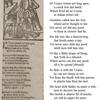4: Ballad excerpt, “Gernutus a Jew,” approximately 1620.
This excerpt comes from a ballad that tells a story quite similar to that of Shylock and Antonio (after the excerpt, Gernutus demands a pound of flesh from a merchant, and in the end a judge warns him to “shed no drop of blood” and to not “take either more or lesse” than a pound, or else “be hanged”). Though the publication date for the ballad is two decades after Shakespeare is said to have composed The Merchant of Venice, there’s no way to know whether the play inspired the ballad, or whether the ballad was just one published version of a story that had circulated long before the play, and had therefore helped to inspire Shakespeare. The section excerpted here focuses on the description of Gernutus.
Suggested Activity: Read the excerpt from the ballad, and discuss the similarities and differences between Gernutus and Shylock. Is one more or less sympathetic? Is there as much ambiguity in the character of Gernutus as there is in Shylock? Compared to a play, how much room does a ballad (which would have been performed like a song) give performers to interpret characters? Finally, how does it change the way you think about Shakespeare’s play to know that he may have been drawing on a common folk story of his time?
Source: “A new Song, shewing the crueltie of Gernutus a Jew,” c. 1620, EBBA 20063, English Broadside Ballad Archive, University of California at Santa Barbara, http://ebba.english.ucsb.edu/ballad/20063/transcription.
Crop_of_Gernutus_combined.jpg
 Download image (365.92 KB)
Download image (365.92 KB)

